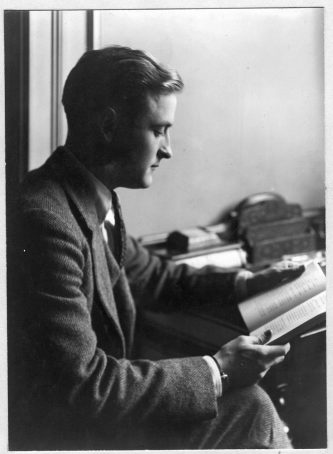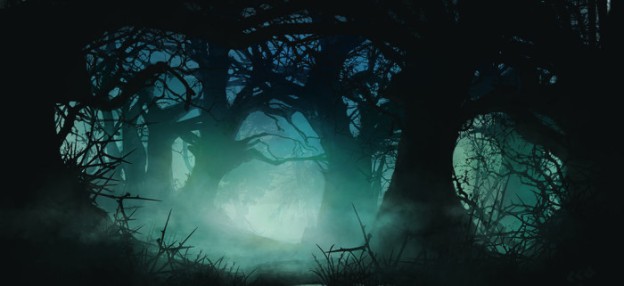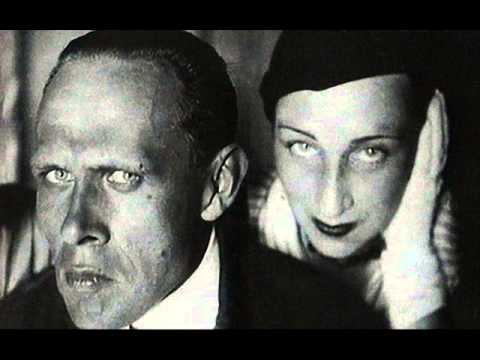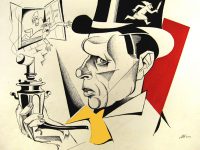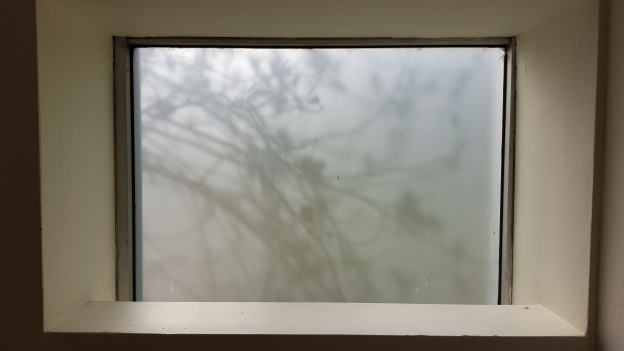“Babylon Revisited”
by F. Scott Fitzgerald
I.
“And where’s Mr. Campbell?” Charlie asked.
“Gone to Switzerland. Mr. Campbell’s a pretty sick man, Mr. Wales.”
“I’m sorry to hear that. And George Hardt?” Charlie inquired.
“Back in America, gone to work.”
“And where is the Snow Bird?”
“He was in here last week. Anyway, his friend, Mr. Schaeffer, is in Paris.”
Two familiar names from the long list of a year and a half ago. Charlie scribbled an address in his notebook and tore out the page.
“If you see Mr. Schaeffer, give him this,” he said.”It’s my brother-in-law’s address. I haven’t settled on a hotel yet.”
He was not really disappointed to find Paris was so empty. But the stillness in the Ritz bar was strange and portentous. It was not an American bar any more–he felt polite in it, and not as if he owned it. It had gone back into France. He felt the stillness from the moment he got out of the taxi and saw the doorman, usually in a frenzy of activity at this hour, gossiping with a chasseurby the servants’ entrance.
Passing through the corridor, he heard only a single, bored voice in the once-clamorous women’s room. When he turned into the bar he travelled the twenty feet of green carpet with his eyes fixed straight ahead by old habit; and then, with his foot firmly on the rail, he turned and surveyed the room, encountering only a single pair of eyes that fluttered up from a newspaper in the corner. Charlie asked for the head barman, Paul, who in the latter days of the bull market had come to work in his own custom-built car–disembarking, however, with due nicety at the nearest corner. But Paul was at his country house today and Alix giving him information.
“No, no more,” Charlie said, “I’m going slow these days.”
Alix congratulated him: “You were going pretty strong a couple of years ago.”
“I’ll stick to it all right,” Charlie assured him.”I’ve stuck to it for over a year and a half now.”
“How do you find conditions in America?”
“I haven’t been to America for months. I’m in business in Prague, representing a couple of concerns there. They don’t know about me down there.”
Alix smiled.
“Remember the night of George Hardt’s bachelor dinner here?” said Charlie.”By the way, what’s become of Claude Fessenden?”
Alix lowered his voice confidentially: “He’s in Paris, but he doesn’t come here any more. Paul doesn’t allow it. He ran up a bill of thirty thousand francs, charging all his drinks and his lunches, and usually his dinner, for more than a year. And when Paul finally told him he had to pay, he gave him a bad check.”
Alix shook his head sadly.
“I don’t understand it, such a dandy fellow. Now he’s all bloated up–” He made a plump apple of his hands.
Charlie watched a group of strident queens installing themselves in a corner.
“Nothing affects them,” he thought.”Stocks rise and fall, people loaf or work, but they go on forever.” The place oppressed him. He called for the dice and shook with Alix for the drink.
“Here for long, Mr. Wales?”
“I’m here for four or five days to see my little girl.”
“Oh-h! You have a little girl?”
Outside, the fire-red, gas-blue, ghost-green signs shone smokily through the tranquil rain. It was late afternoon and the streets were in movement; the bistrosgleamed. At the corner of the Boulevard des Capucines he took a taxi. The Place de la Concorde moved by in pink majesty; they crossed the logical Seine, and Charlie felt the sudden provincial quality of the Left Bank.
Charlie directed his taxi to the Avenue de l’Opera, which was out of his way. But he wanted to see the blue hour spread over the magnificent façade, and imagine that the cab horns, playing endlessly the first few bars of La Plus que Lent,were the trumpets of the Second Empire. They were closing the iron grill in front of Brentano’s Book-store, and people were already at dinner behind the trim little bourgeois hedge of Duval’s. He had never eaten at a really cheap restaurant in Paris. Five-course dinner, four francs fifty, eighteen cents, wine included. For some odd reason he wished that he had.
As they rolled on to the Left Bank and he felt its sudden provincialism, he thought, “I spoiled this city for myself. I didn’t realize it, but the days came along one after another, and then two years were gone, and everything was gone, and I was gone.”
He was thirty-five, and good to look at. The Irish mobility of his face was sobered by a deep wrinkle between his eyes. As he rang his brother-in-law’s bell in the Rue Palatine, the wrinkle deepened till it pulled down his brows; he felt a cramping sensation in his belly. From behind the maid who opened the door darted a lovely little girl of nine who shrieked “Daddy!” and flew up, struggling like a fish, into his arms. She pulled his head around by one ear and set her cheek against his.
“My old pie,” he said.
“Oh, daddy, daddy, daddy, daddy, dads, dads, dads!”
She drew him into the salon, where the family waited, a boy and girl his daughter’s age, his sister-in-law and her husband. He greeted Marion with his voice pitched carefully to avoid either feigned enthusiasm or dislike, but her response was more frankly tepid, though she minimized her expression of unalterable distrust by directing her regard toward his child. The two men clasped hands in a friendly way and Lincoln Peters rested his for a moment on Charlie’s shoulder.
The room was warm and comfortably American. The three children moved intimately about, playing through the yellow oblongs that led to other rooms; the cheer of six o’clock spoke in the eager smacks of the fire and the sounds of French activity in the kitchen. But Charlie did not relax; his heart sat up rigidly in his body and he drew confidence from his daughter, who from time to time came close to him, holding in her arms the doll he had brought.
“Really extremely well,” he declared in answer to Lincoln’s question.”There’s a lot of business there that isn’t moving at all, but we’re doing even better than ever. In fact, damn well. I’m bringing my sister over from America next month to keep house for me. My income last year was bigger than it was when I had money. You see, the Czechs–“
His boasting was for a specific purpose; but after a moment, seeing a faint restiveness in Lincoln’s eye, he changed the subject:
“Those are fine children of yours, well brought up, good manners.”
“We think Honoria’s a great little girl too.”
Marion Peters came back from the kitchen. She was a tall woman with worried eyes, who had once possessed a fresh American loveliness. Charlie had never been sensitive to it and was always surprised when people spoke of how pretty she had been. From the first there had been an instinctive antipathy between them.
“Well, how do you find Honoria?” she asked.
“Wonderful. I was astonished how much she’s grown in ten months. All the children are looking well.”
“We haven’t had a doctor for a year. How do you like being back in Paris?”
“It seems very funny to see so few Americans around.”
“I’m delighted,” Marion said vehemently.”Now at least you can go into a store without their assuming you’re a millionaire. We’ve suffered like everybody, but on the whole it’s a good deal pleasanter.”
“But it was nice while it lasted,” Charlie said.”We were a sort of royalty, almost infallible, with a sort of magic around us. In the bar this afternoon”–he stumbled, seeing his mistake–“there wasn’t a man I knew.”
She looked at him keenly.”I should think you’d have had enough of bars.”
“I only stayed a minute. I take one drink every afternoon, and no more.”
“Don’t you want a cocktail before dinner?” Lincoln asked.
“I take only one drink every afternoon, and I’ve had that.”
“I hope you keep to it,” said Marion.
Her dislike was evident in the coldness with which she spoke, but Charlie only smiled; he had larger plans. Her very aggressiveness gave him an advantage, and
he knew enough to wait. He wanted them to initiate the discussion of what they knew had brought him to Paris.
At dinner he couldn’t decide whether Honoria was most like him or her mother. Fortunate if she didn’t combine the traits of both that had brought them to disaster. A great wave of protectiveness went over him. He thought he knew what to do for her. He believed in character; he wanted to jump back a whole generation and trust in character again as the eternally valuable element. Everything wore out.
He left soon after dinner, but not to go home. He was curious to see Paris by night with clearer and more judicious eyes than those of other days. He bought a strapontinfor the Casino and watched Josephine Baker go through her chocolate arabesques.
After an hour he left and strolled toward Montmartre, up the Rue Pigalle into the Place Blanche. The rain had stopped and there were a few people in evening clothes disembarking from taxis in front of cabarets, and cocottesprowling singly or in pairs, and many Negroes. He passed a lighted door from which issued music, and stopped with the sense of familiarity; it was Bricktop’s, where he had parted with so many hours and so much money. A few doors farther on he found another ancient rendezvous and incautiously put his head inside. Immediately an eager orchestra burst into sound, a pair of professional dancers leaped to their feet and a maître d’hôtel swooped toward him, crying, “Crowd just arriving, sir!” But he withdrew quickly.
“You have to be damn drunk,” he thought.
Zelli’s was closed, the bleak and sinister cheap hotels surrounding it were dark; up in the Rue Blanche there was more light and a local, colloquial French crowd. The Poet’s Cave had disappeared, but the two great mouths of the Café of Heaven and the Café of Hell still yawned–even devoured, as he watched, the meager contents of a tourist bus–a German, a Japanese, and an American couple who glanced at him with frightened eyes.
So much for the effort and ingenuity of Montmartre. All the catering to vice and waste was on an utterly childish scale, and he suddenly realized the meaning of the word “dissipate”–to dissipate into thin air; to make nothing out of something. In the little hours of the night every move from place to place was an enormous human jump, an increase of paying for the privilege of slower and slower motion.
He remembered thousand-franc notes given to an orchestra for playing a single number, hundred-franc notes tossed to a doorman for calling a cab.
But it hadn’t been given for nothing.
It had been given, even the most wildly squandered sum, as an offering to destiny that he might not remember the things most worth remembering, the things that now he would always remember–his child taken from his control, his wife escaped to a grave in Vermont.
In the glare of a brasseriea woman spoke to him. He bought her some eggs and coffee, and then, eluding her encouraging stare, gave her a twenty-franc note and took a taxi to his hotel.
II.
He woke upon a fine fall day–football weather. The depression of yesterday was gone and he liked the people on the streets. At noon he sat opposite Honoria at Le Grand Vatel, the only restaurant he could think of not reminiscent of champagne dinners and long luncheons that began at two and ended in a blurred and vague twilight.
“Now, how about vegetables? Oughtn’t you to have some vegetables?”
“Well, yes.”
“Here’s épinardsand chou-fleurand carrots and haricots.”
“I’d like chou-fleur.”
“Wouldn’t you like to have two vegetables?”
“I usually only have one at lunch.”
The waiter was pretending to be inordinately fond of children. “Qu’elle est mignonne la petite? Elle parle exactement comme une Française.”
“How about dessert? Shall we wait and see?”
The waiter disappeared. Honoria looked at her father expectantly.
“What are we going to do?”
“First, we’re going to that toy store in the Rue Saint-Honoré and buy you anything you like. And then we’re going to the vaudeville at the Empire.”
She hesitated.”I like it about the vaudeville, but not the toy store.”
“Why not?”
“Well, you brought me this doll.” She had it with her.”And I’ve got lots of things. And we’re not rich any more, are we?”
“We never were. But today you are to have anything you want.”
“All right,” she agreed resignedly.
When there had been her mother and a French nurse he had been inclined to be strict; now he extended himself, reached out for a new tolerance; he must be both parents to her and not shut any of her out of communication.
“I want to get to know you,” he said gravely.”First let me introduce myself. My name is Charles J. Wales, of Prague.”
“Oh, daddy!” her voice cracked with laughter.
“And who are you, please?” he persisted, and she accepted a role immediately: “Honoria Wales, Rue Palatine, Paris.”
“Married or single?”
“No, not married. Single.”
He indicated the doll.”But I see you have a child, madame.”
Unwilling to disinherit it, she took it to her heart and thought quickly: “Yes, I’ve been married, but I’m not married now. My husband is dead.”
He went on quickly, “And the child’s name?”
“Simone. That’s after my best friend at school.”
“I’m very pleased that you’re doing so well at school.”
“I’m third this month,” she boasted.”Elsie”–that was her cousin–“is only about eighteenth, and Richard is about at the bottom.”
“You like Richard and Elsie, don’t you?”
“Oh, yes. I like Richard quite well and I like her all right.”
Cautiously and casually he asked: “And Aunt Marion and Uncle Lincoln–which do you like best?”
“Oh, Uncle Lincoln, I guess.”
He was increasingly aware of her presence. As they came in, a murmur of “… adorable” followed them, and now the people at the next table bent all their silences upon her, staring as if she were something no more conscious than a flower.
“Why don’t I live with you?” she asked suddenly.”Because mamma’s dead?”
“You must stay here and learn more French. It would have been hard for daddy to take care of you so well.”
“I don’t really need much taking care of any more. I do everything for myself.”
Going out of the restaurant, a man and a woman unexpectedly hailed him.
“Well, the old Wales!”
“Hello there, Lorraine…. Dunc.”
Sudden ghosts out of the past: Duncan Schaeffer, a friend from college. Lorraine Quarrles, a lovely, pale blonde of thirty; one of a crowd who had helped them make months into days in the lavish times of three years ago.
“My husband couldn’t come this year,” she said, in answer to his question.”We’re poor as hell. So he gave me two hundred a month and told me I could do my worst on that…. This your little girl?”
“What about coming back and sitting down?” Duncan asked.
“Can’t do it.” He was glad for an excuse. As always, he felt Lorraine’s passionate, provocative attraction, but his own rhythm was different now.
“Well, how about dinner?” she asked.
“I’m not free. Give me your address and let me call you.”
“Charlie, I believe you’re sober,” she said judicially.”I honestly believe he’s sober, Dunc. Pinch him and see if he’s sober.”
Charlie indicated Honoria with his head. They both laughed.
“What’s your address?” said Duncan sceptically.
He hesitated, unwilling to give the name of his hotel.
“I’m not settled yet. I’d better call you. We’re going to see the vaudeville at the Empire.”
“There! That’s what I want to do,” Lorraine said.”I want to see some clowns and acrobats and jugglers. That’s just what we’ll do, Dunc.”
“We’ve got to do an errand first,” said Charlie.”Perhaps we’ll see you there.”
“All right, you snob…. Good-by, beautiful little girl.”
“Good-by.”
Honoria bobbed politely.
Somehow, an unwelcome encounter. They liked him because he was functioning, because he was serious; they wanted to see him, because he was stronger than they were now, because they wanted to draw a certain sustenance from his strength.
At the Empire, Honoria proudly refused to sit upon her father’s folded coat. She was already an individual with a code of her own, and Charlie was more and more absorbed by the desire of putting a little of himself into her before she crystallized utterly. It was hopeless to try to know her in so short a time.
Between the acts they came upon Duncan and Lorraine in the lobby where the band was playing.
“Have a drink?”
“All right, but not up at the bar. We’ll take a table.”
“The perfect father.”
Listening abstractedly to Lorraine, Charlie watched Honoria’s eyes leave their table, and he followed them wistfully about the room, wondering what they saw. He met her glance and she smiled.
“I liked that lemonade,” she said.
What had she said? What had he expected? Going home in a taxi afterward, he pulled her over until her head rested against his chest.
“Darling, do you ever think about your mother?”
“Yes, sometimes,” she answered vaguely.
“I don’t want you to forget her. Have you got a picture of her?”
“Yes, I think so. Anyhow, Aunt Marion has. Why don’t you want me to forget her?”
“She loved you very much.”
“I loved her too.”
They were silent for a moment.
“Daddy, I want to come and live with you,” she said suddenly.
His heart leaped; he had wanted it to come like this.
“Aren’t you perfectly happy?”
“Yes, but I love you better than anybody. And you love me better than anybody, don’t you, now that mummy’s dead?”
“Of course I do. But you won’t always like me best, honey. You’ll grow up and meet somebody your own age and go marry him and forget you ever had a daddy.”
“Yes, that’s true,” she agreed tranquilly.
He didn’t go in. He was coming back at nine o’clock and he wanted to keep himself fresh and new for the thing he must say then.
“When you’re safe inside, just show yourself in that window.”
“All right. Good-by, dads, dads, dads, dads.”
He waited in the dark street until she appeared, all warm and glowing, in the window above and kissed her fingers out into the night.
III.
They were waiting. Marion sat behind the coffee service in a dignified black dinner dress that just faintly suggested mourning. Lincoln was walking up and down with the animation of one who had already been talking. They were as anxious as he was to get into the question. He opened it almost immediately:
“I suppose you know what I want to see you about–why I really came to Paris.”
Marion played with the black stars on her necklace and frowned.
“I’m awfully anxious to have a home,” he continued.”And I’m awfully anxious to have Honoria in it. I appreciate your taking in Honoria for her mother’s sake, but things have changed now”–he hesitated and then continued more forcibly–“changed radically with me, and I want to ask you to reconsider the matter. It would be silly for me to deny that about three years ago I was acting badly–“
Marion looked up at him with hard eyes.
“–but all that’s over. As I told you, I haven’t had more than a drink a day for over a year, and I take that drink deliberately, so that the idea of alcohol won’t get too big in my imagination. You see the idea?”
“No,” said Marion succinctly.
“It’s a sort of stunt I set myself. It keeps the matter in proportion.”
“I get you,” said Lincoln.”You don’t want to admit it’s got any attraction for you.”
“Something like that. Sometimes I forget and don’t take it. But I try to take it. Anyhow, I couldn’t afford to drink in my position. The people I represent are more than satisfied with what I’ve done, and I’m bringing my sister over from Burlington to keep house for me, and I want awfully to have Honoria too. You know that even when her mother and I weren’t getting along well we never let anything that happened touch Honoria. I know she’s fond of me and I know I’m able to take care of her and–well, there you are. How do you feel about it?”
He knew that now he would have to take a beating. It would last an hour or two hours, and it would be difficult, but if he modulated his inevitable resentment to the chastened attitude of the reformed sinner, he might win his point in the end.
Keep your temper, he told himself. You don’t want to be justified. You want Honoria.
Lincoln spoke first: “We’ve been talking it over ever since we got your letter last month. We’re happy to have Honoria here. She’s a dear little thing, and we’re glad to be able to help her, but of course that isn’t the question–“
Marion interrupted suddenly.”How long are you going to stay sober, Charlie?” she asked.
“Permanently, I hope.”
“How can anybody count on that?”
“You know I never did drink heavily until I gave up business and came over here with nothing to do. Then Helen and I began to run around with–“
“Please leave Helen out of it. I can’t bear to hear you talk about her like that.”
He stared at her grimly; he had never been certain how fond of each other the sisters were in life.
“My drinking only lasted about a year and a half–from the time we came over until I–collapsed.”
“It was time enough.”
“It was time enough,” he agreed.
“My duty is entirely to Helen,” she said.”I try to think what she would have wanted me to do. Frankly, from the night you did that terrible thing you haven’t really existed for me. I can’t help that. She was my sister.”
“Yes.”
“When she was dying she asked me to look out for Honoria. If you hadn’t been in a sanitarium then, it might have helped matters.”
He had no answer.
“I’ll never in my life be able to forget the morning when Helen knocked at my door, soaked to the skin and shivering, and said you’d locked her out.”
Charlie gripped the sides of the chair. This was more difficult than he expected; he wanted to launch out into a long expostulation and explanation, but he only said: “The night I locked her out–” and she interrupted, “I don’t feel up to going over that again.”
After a moment’s silence Lincoln said: “We’re getting off the subject. You want Marion to set aside her legal guardianship and give you Honoria. I think the main point for her is whether she has confidence in you or not.”
“I don’t blame Marion,” Charlie said slowly, “but I think she can have entire confidence in me. I had a good record up to three years ago. Of course, it’s within human possibilities I might go wrong any time. But if we wait much longer I’ll lose Honoria’s childhood and my chance for a home.” He shook his head, “I’ll simply lose her, don’t you see?”
“Yes, I see,” said Lincoln.
“Why didn’t you think of all this before?” Marion asked.
“I suppose I did, from time to time, but Helen and I were getting along badly. When I consented to the guardianship, I was flat on my back in a sanitarium and the market had cleaned me out. I knew I’d acted badly, and I thought if it would bring any peace to Helen, I’d agree to anything. But now it’s different. I’m functioning, I’m behaving damn well, so far as–“
“Please don’t swear at me,” Marion said.
He looked at her, startled. With each remark the force of her dislike became more and more apparent. She had built up all her fear of life into one wall and faced it toward him. This trivial reproof was possibly the result of some trouble with the cook several hours before. Charlie became increasingly alarmed at leaving Honoria in this atmosphere of hostility against himself; sooner or later it would come out, in a word here, a shake of the head there, and some of that distrust would be irrevocably implanted in Honoria. But he pulled his temper down out of his face and shut it up inside him; he had won a point, for Linc
oln realized the absurdity of Marion’s remark and asked her lightly since when she had objected to the word “damn.”
“Another thing,” Charlie said: “I’m able to give her certain advantages now. I’m going to take a French governess to Prague with me. I’ve got a lease on a new apartment–“
He stopped, realizing that he was blundering. They couldn’t be expected to accept with equanimity the fact that his income was again twice as large as their own.
“I suppose you can give her more luxuries than we can,” said Marion.”When you were throwing away money we were living along watching every ten francs…. I suppose you’ll start doing it again.”
“Oh, no,” he said.”I’ve learned. I worked hard for ten years, you know–until I got lucky in the market, like so many people. Terribly lucky. It didn’t seem any use working any more, so I quit. It won’t happen again.”
There was a long silence. All of them felt their nerves straining, and for the first time in a year Charlie wanted a drink. He was sure now that Lincoln Peters wanted him to have his child.
Marion shuddered suddenly; part of her saw that Charlie’s feet were planted on the earth now, and her own maternal feeling recognized the naturalness of his desire; but she had lived for a long time with a prejudice–a prejudice founded on a curious disbelief in her sister’s happiness, and which, in the shock of one terrible night, had turned to hatred for him. It had all happened at a point in her life where the discouragement of ill health and adverse circumstances made it necessary for her to believe in tangible villainy and a tangible villain.
“I can’t help what I think!” she cried out suddenly.”How much you were responsible for Helen’s death, I don’t know. It’s something you’ll have to square with your own conscience.”
An electric current of agony surged through him; for a moment he was almost on his feet, an unuttered sound echoing in his throat. He hung on to himself for a moment, another moment.
“Hold on there,” said Lincoln uncomfortably.”I never thought you were responsible for that.”
“Helen died of heart trouble,” Charlie said dully.
“Yes, heart trouble.” Marion spoke as if the phrase had another meaning for her.
Then, in the flatness that followed her outburst, she saw him plainly and she knew he had somehow arrived at control over the situation. Glancing at her husband, she found no help from him, and as abruptly as if it were a matter of no importance, she threw up the sponge.
“Do what you like!” she cried, springing up from her chair.”She’s your child. I’m not the person to stand in your way. I think if it were my child I’d rather see her–” She managed to check herself.”You two decide it. I can’t stand this. I’m sick. I’m going to bed.”
She hurried from the room; after a moment Lincoln said:
“This has been a hard day for her. You know how strongly she feels–” His voice was almost apologetic: “When a woman gets an idea in her head.”
“Of course.”
“It’s going to be all right. I think she sees now that you–can provide for the child, and so we can’t very well stand in your way or Honoria’s way.”
“Thank you, Lincoln.”
“I’d better go along and see how she is.”
“I’m going.”
He was still trembling when he reached the street, but a walk down the Rue Bonaparte to the quais set him up, and as he crossed the Seine, fresh and new by the quai lamps, he felt exultant. But back in his room he couldn’t sleep. The image of Helen haunted him. Helen whom he had loved so until they had senselessly begun to abuse each other’s love, tear it into shreds. On that terrible February night that Marion remembered so vividly, a slow quarrel had gone on for hours. There was a scene at the Florida, and then he attempted to take her home, and then she kissed young Webb at a table; after that there was what she had hysterically said. When he arrived home alone he turned the key in the lock in wild anger. How could he know she would arrive an hour later alone, that there would be a snowstorm in which she wandered about in slippers, too confused to find a taxi? Then the aftermath, her escaping pneumonia by a miracle, and all the attendant horror. They were “reconciled,” but that was the beginning of the end, and Marion, who had seen with her own eyes and who imagined it to be one of many scenes from her sister’s martyrdom, never forgot.
Going over it again brought Helen nearer, and in the white, soft light that steals upon half sleep near morning he found himself talking to her again. She said that he was perfectly right about Honoria and that she wanted Honoria to be with him. She said she was glad he was being good and doing better. She said a lot of other things–very friendly things–but she was in a swing in a white dress, and swinging faster and faster all the time, so that at the end he could not hear clearly all that she said.
IV.
He woke up feeling happy. The door of the world was open again. He made plans, vistas, futures for Honoria and himself, but suddenly he grew sad, remembering all the plans he and Helen had made. She had not planned to die. The present was the thing–work to do and someone to love. But not to love too much, for he knew the injury that a father can do to a daughter or a mother to a son by attaching them too closely: afterward, out in the world, the child would seek in the marriage partner the same blind tenderness and, failing probably to find it, turn against love and life.
It was another bright, crisp day. He called Lincoln Peters at the bank where he worked and asked if he could count on taking Honoria when he left for Prague. Lincoln agreed that there was no reason for delay. One thing–the legal guardianship. Marion wanted to retain that a while longer. She was upset by the whole matter, and it would oil things if she felt that the situation was still in her control for another year. Charlie agreed, wanting only the tangible, visible child.
Then the question of a governess. Charlie sat in a gloomy agency and talked to a cross Béarnaise and to a buxom Breton peasant, neither of whom he could have endured. There were others whom he would see tomorrow.
He lunched with Lincoln Peters at Griffons, trying to keep down his exultation.
“There’s nothing quite like your own child,” Lincoln said.”But you understand how Marion feels too.”
“She’s forgotten how hard I worked for seven years there,” Charlie said.”She just remembers one night.”
“There’s another thing.” Lincoln hesitated.”While you and Helen were tearing around Europe throwing money away, we were just getting along. I didn’t touch any of the prosperity because I never got ahead enough to carry anything but my insurance. I think Marion felt there was some kind of injustice in it–you not even working toward the end, and getting richer and richer.”
“It went just as quick as it came,” said Charlie.
“Yes, a lot of it stayed in the hands of chasseursand saxophone players and maîtres d’hôtel–well, the big party’s over now. I just said that to explain Marion’s feeling about those crazy years. If you drop in about six o’clock tonight before Marion’s too tired, we’ll settle the details on the spot.”
Back at his hotel, Charlie found a pneumatiquethat had been redirected from the Ritz bar where Charlie had left his address for the purpose of finding a certain man.
DEAR CHARLIE: You were so strange when we saw you the other day that I wondered if I did something to offend you. If so, I’m not conscious of it. In fact, I have thought about you too much for the last year, and it’s always been in the back of my mind that I might see you if I came over here. We didhave such good times that crazy spring, like the night you and I stole the butcher’s tricycle, and the time we tried to call on the president and you had the old derby rim and the wire cane. Everybody seems so old lately, but I don’t feel old a bit. Couldn
‘t we get together some time today for old time’s sake? I’ve got a vile hang-over for the moment, but will be feeling better this afternoon and will look for you about five in the sweat-shop at the Ritz.Always devotedly,
LORRAINE.
His first feeling was one of awe that he had actually, in his mature years, stolen a tricycle and pedalled Lorraine all over the Étoile between the small hours and dawn. In retrospect it was a nightmare. Locking out Helen didn’t fit in with any other act of his life, but the tricycle incident did–it was one of many. How many weeks or months of dissipation to arrive at that condition of utter irresponsibility?
He tried to picture how Lorraine had appeared to him then–very attractive; Helen was unhappy about it, though she said nothing. Yesterday, in the restaurant, Lorraine had seemed trite, blurred, worn away. He emphatically did not want to see her, and he was glad Alix had not given away his hotel address. It was a relief to think, instead, of Honoria, to think of Sundays spent with her and of saying good morning to her and of knowing she was there in his house at night, drawing her breath in the darkness.
At five he took a taxi and bought presents for all the Peters–a piquant cloth doll, a box of Roman soldiers, flowers for Marion, big linen handkerchiefs for Lincoln.
He saw, when he arrived in the apartment, that Marion had accepted the inevitable. She greeted him now as though he were a recalcitrant member of the family, rather than a menacing outsider. Honoria had been told she was going; Charlie was glad to see that her tact made her conceal her excessive happiness. Only on his lap did she whisper her delight and the question “When?” before she slipped away with the other children.
He and Marion were alone for a minute in the room, and on an impulse he spoke out boldly:
“Family quarrels are bitter things. They don’t go according to any rules. They’re not like aches or wounds; they’re more like splits in the skin that won’t heal because there’s not enough material. I wish you and I could be on better terms.”
“Some things are hard to forget,” she answered.”It’s a question of confidence.” There was no answer to this and presently she asked, “When do you propose to take her?”
“As soon as I can get a governess. I hoped the day after tomorrow.”
“That’s impossible. I’ve got to get her things in shape. Not before Saturday.”
He yielded. Coming back into the room, Lincoln offered him a drink.
“I’ll take my daily whisky,” he said.
It was warm here, it was a home, people together by a fire. The children felt very safe and important; the mother and father were serious, watchful. They had things to do for the children more important than his visit here. A spoonful of medicine was, after all, more important than the strained relations between Marion and himself. They were not dull people, but they were very much in the grip of life and circumstances. He wondered if he couldn’t do something to get Lincoln out of his rut at the bank.
A long peal at the door-bell; the bonne à tout fairepassed through and went down the corridor. The door opened upon another long ring, and then voices, and the three in the salon looked up expectantly; Lincoln moved to bring the corridor within his range of vision, and Marion rose. Then the maid came back along the corridor, closely followed by the voices, which developed under the light into Duncan Schaeffer and Lorraine Quarrles.
They were gay, they were hilarious, they were roaring with laughter. For a moment Charlie was astounded; unable to understand how they ferreted out the Peters’ address.
“Ah-h-h!” Duncan wagged his finger roguishly at Charlie.”Ah-h-h!”
They both slid down another cascade of laughter. Anxious and at a loss, Charlie shook hands with them quickly and presented them to Lincoln and Marion. Marion nodded, scarcely speaking. She had drawn back a step toward the fire; her little girl stood beside her, and Marion put an arm about her shoulder.
With growing annoyance at the intrusion, Charlie waited for them to explain themselves. After some concentration Duncan said:
“We came to invite you out to dinner. Lorraine and I insist that all this shishi, cagy business ’bout your address got to stop.”
Charlie came closer to them, as if to force them backward down the corridor.
“Sorry, but I can’t. Tell me where you’ll be and I’ll phone you in half an hour.”
This made no impression. Lorraine sat down suddenly on the side of a chair, and focussing her eyes on Richard, cried, “Oh, what a nice little boy! Come here, little boy.” Richard glanced at his mother, but did not move. With a perceptible shrug of her shoulders, Lorraine turned back to Charlie:
“Come and dine. Sure your cousins won’ mine. See you so sel’om. Or solemn.”
“I can’t,” said Charlie sharply.”You two have dinner and I’ll phone you.”
Her voice became suddenly unpleasant.”All right, we’ll go. But I remember once when you hammered on my door at four A. M. I was enough of a good sport to give you a drink. Come on, Dunc.”
Still in slow motion, with blurred, angry faces, with uncertain feet, they retired along the corridor.
“Good night,” Charlie said.
“Good night!” responded Lorraine emphatically.
When he went back into the salon Marion had not moved, only now her son was standing in the circle of her other arm. Lincoln was still swinging Honoria back and forth like a pendulum from side to side.
“What an outrage!” Charlie broke out.”What an absolute outrage!” Neither of them answered. Charlie dropped into an armchair, picked up his drink, set it down again and said:
“People I haven’t seen for two years having the colossal nerve–“
He broke off. Marion had made the sound “Oh!” in one swift, furious breath, turned her body from him with a jerk and left the room.
Lincoln set down Honoria carefully.
“You children go in and start your soup,” he said, and when they obeyed, he said to Charlie:
“Marion’s not well and she can’t stand shocks. That kind of people make her really physically sick.”
“I didn’t tell them to come here. They wormed your name out of somebody. They deliberately–“
“Well, it’s too bad. It doesn’t help matters. Excuse me a minute.”
Left alone, Charlie sat tense in his chair. In the next room he could hear the children eating, talking in monosyllables, already oblivious to the scene between their elders. He heard a murmur of conversation from a farther room and then the ticking bell of a telephone receiver picked up, and in a panic he moved to the other side of the room and out of earshot.
In a minute Lincoln came back.”Look here, Charlie. I think we’d better call off dinner for tonight. Marion’s in bad shape.”
“Is she angry with me?”
“Sort of,” he said, almost roughly.”She’s not strong and–“
“You mean she’s changed her mind about Honoria?”
“She’s pretty bitter right now. I don’t know. You phone me at the bank tomorrow.”
“I wish you’d explain to her I never dreamed these people would come here. I’m just as sore as you are.”
“I couldn’t explain anything to her now.”
Charlie got up. He took his coat and hat and started down the corridor. Then he opened the door of the dining room and said in a strange voice, “Good night, children.”
Honoria rose and ran around the table to hug him.
“Good night, sweetheart,” he said vaguely, and then trying to make his voice more tender, trying to conciliate something, “Good night, dear children.”
V.
Charlie went directly to the Ritz bar with the furious idea of finding Lorraine and Duncan, but they were not there, and he realized that in any case there was nothing he could do. He had not touched his drink at the Peters’, and now he ordered a whisky-and-soda. Paul came over to say hello.
“It’s a great change,” he said sadly.”We do about half the business we did. So many fellows I hear about back in the States lost everything, maybe not in the first crash, but then in the second. Your friend George Hardt lost every cent, I hear. Are you back in the States?”
“No, I’m in business in Prague.”
“I heard that you lost a lot in the crash.”
“I did,” and he added grimly, “but I lost everything I wanted in the boom.”
“Selling short.”
“Something like that.”
Again the memory of those days swept over him like a nightmare–the people they had met travelling; then people who couldn’t add a row of figures or speak a coherent sentence. The little man Helen had consented to dance with at the ship’s party, who had insulted her ten feet from the table; the women and girls carried screaming with drink or drugs out of public places–
–The men who locked their wives out in the snow, because the snow of twenty-nine wasn’t real snow. If you didn’t want it to be snow, you just paid some money.
He went to the phone and called the Peters’ apartment; Lincoln answered.
“I called up because this thing is on my mind. Has Marion said anything definite?”
“Marion’s sick,” Lincoln answered shortly.” I know this thing isn’t altogether your fault, but I can’t have her go to pieces about it. I’m afraid we’ll have to let it slide for six months; I can’t take the chance of working her up to this state again.”
“I see.”
“I’m sorry, Charlie.”
He went back to his table. His whisky glass was empty, but he shook his head when Alix looked at it questioningly. There wasn’t much he could do now except send Honoria some things; he would send her a lot of things tomorrow. He thought rather angrily that this was just money–he had given so many people money….
“No, no more,” he said to another waiter. ”What do I owe you?”
He would come back some day; they couldn’t make him pay forever. But he wanted his child, and nothing was much good now, beside that fact. He wasn’t young any more, with a lot of nice thoughts and dreams to have by himself. He was absolutely sure Helen wouldn’t have wanted him to be so alone.
~ * ~ * ~ * ~
